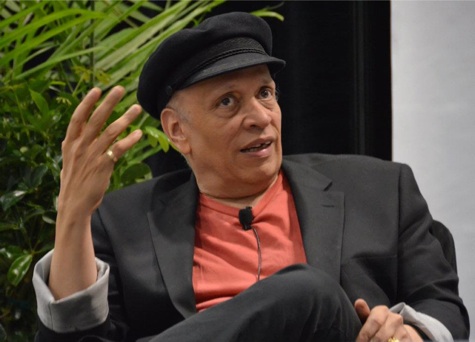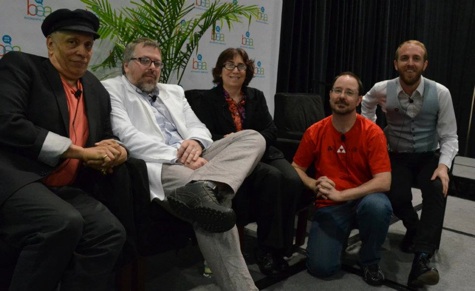Back in May, Walter Mosley wrote a post for Tor.com making “the case for genre,” so it’s only natural that the first question from Ryan Britt during Tuesday afternoon’s Tor.com Author Stage event at BookExpo America should be based on that essay: Does science fiction prepare us for real life?
Mosley covered some of the same territory he’d written about, discussing science fiction as “the kind of writing that prepares us for the necessary mutations brought about in society from an ever changing technological world,” and emphasizing that although it may be looked at by some critics as an excluded gerne now, it’s important to remember that in years past, authors from Jules Verne to George Orwell used science fictional forms to talk about what it meant to be a human in the society of the time, and as that society was undergoing massive upheavals. In some ways, he observed, it’s literary fiction that has excluded itself from that conversation.
Jeff VanderMeer, the co-editor (with Ann VanderMeer) of the massive The Weird, observed that weird fiction didn’t necessarily prepare you for life, except in a psychological sense, but that it served a function similar to that of fairy tales in early cultures—a way to produce what Ann called “an explanation of the unknown.” As John Scalzi pointed out, sometimes the real world is so bizarre we need weird stories to explain it; his own adolescent daughter responded to the recent news about the face-eating murderer by announcing the zombie apocalypse had begun. Heck, the Center for Disease Control even issued a statement saying the zombie apocalypse hadn’t begun. (Although, as Athena Scalzi points out, “That’s what the government would say.”)
Jeff also discussed the ways in which he and Ann worked to expand the definition of “weird fiction” beyond the white American and British fantasy writers found in previous anthologies covering the genre. “There was that stuff,” he conceded, “but there’s also all this other stuff,” and by including stories by writers from countries like Japan and Nigeria, The Weird aims to open up the conversation in a more meaningful way. “We were looking for the classic stories,” Ann added, “but also the stories that had dated well.”
 In response to a question about how his most recent novel, Redshirts, plays off the imagery of classic SF television shows, Scalzi noted that all writers, not just science fiction writers, are trying to reach their contemporaries, unless “you’re Tristan Tzara throwing strips of paper into a hat or whatever.” With science fiction, he added, it was a case of “using the things they know to push them into the things they don’t know.” And, he commented later, when the topic had shifted to the skiffyness of that hologram technology “resurrecting” Tupac, technology has always been about keeping the past alive well into the future. “Ayn Rand is a much more influential person today than she ever was before,” he reminded the audience, and that’s just from the technology of the printed book.
In response to a question about how his most recent novel, Redshirts, plays off the imagery of classic SF television shows, Scalzi noted that all writers, not just science fiction writers, are trying to reach their contemporaries, unless “you’re Tristan Tzara throwing strips of paper into a hat or whatever.” With science fiction, he added, it was a case of “using the things they know to push them into the things they don’t know.” And, he commented later, when the topic had shifted to the skiffyness of that hologram technology “resurrecting” Tupac, technology has always been about keeping the past alive well into the future. “Ayn Rand is a much more influential person today than she ever was before,” he reminded the audience, and that’s just from the technology of the printed book.
Towards the end of the half-hour session, Ryan wondered if the shifting online book market, particularly the lack of shelf space grouping specific books into set categories, might transform science fiction’s literary status. “Readers are going to be able to explore more easily,” Ann said, “and they’re going to want to do that.” But Jeff wasn’t so sure; he’d been having these conversations at writer’s conferences and book festivals for years, and was “less optimistic that they mean anything” as time went on.
“OMG, Jeff VanderMeer, do you need a hug?” Scalzi exclaimed, before noting, more seriously, that readers would always choose self-select for science fiction and other genres, however they chose to define them: “There will always be tribes. There will always be affiliations.”

Mosley told a very instructive story at this point, related to one of the first books he wrote, Gone Fishin’. When he showed it to publishers, he said, he was told, “White people don’t read about black people. Black women don’t like to read about black men. Black men don’t like to read. So who’s going to buy your book?”
That might have reflected a market reality, Mosley continued, but “if it was true, it was because they made it true.” Jeff concurred, identifying this as just one example of the “narrow operational realities” of contemporary book publishing, “a failure of vision” that keeps the industry stuck in a rut. Scalzi drove that nail in further to conclude the panel, saying that whenever we talk about the state of genre, “it shouldn’t be implicit that this is how it’s always been and how it will always be.” If the history of the genre has taught us anything, it’s that what it means to be science fiction, or to be a science fiction reader, is a highly fluid concept, and one that will continue to change with the times.
Ron Hogan is the founding curator of Beatrice.com, one of the first websites to focus on books and authors. Lately, he’s been reviewing science fiction and fantasy for Shelf Awareness.










